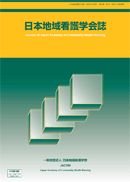Volume 23, Issue 2
Displaying 1-7 of 7 articles from this issue
- |<
- <
- 1
- >
- >|
Original Articles
-
2020 Volume 23 Issue 2 Pages 4-11
Published: 2020
Released on J-STAGE: August 20, 2020
Download PDF (1191K) -
2020 Volume 23 Issue 2 Pages 12-20
Published: 2020
Released on J-STAGE: August 20, 2020
Download PDF (1227K)
Research Reports
-
2020 Volume 23 Issue 2 Pages 21-32
Published: 2020
Released on J-STAGE: August 20, 2020
Download PDF (1234K) -
2020 Volume 23 Issue 2 Pages 33-42
Published: 2020
Released on J-STAGE: August 20, 2020
Download PDF (1215K) -
2020 Volume 23 Issue 2 Pages 1-
Published: 2020
Released on J-STAGE: September 03, 2020
Download PDF (238K) -
2020 Volume 23 Issue 2 Pages 43-51
Published: 2020
Released on J-STAGE: August 20, 2020
Download PDF (1212K)
Information
-
2020 Volume 23 Issue 2 Pages 52-58
Published: 2020
Released on J-STAGE: August 20, 2020
Download PDF (1113K)
- |<
- <
- 1
- >
- >|
